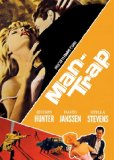| Reviews & Columns |
|
Reviews DVD TV on DVD Blu-ray 4K UHD International DVDs In Theaters Reviews by Studio Video Games Features Collector Series DVDs Easter Egg Database Interviews DVD Talk Radio Feature Articles Columns Anime Talk DVD Savant Horror DVDs The M.O.D. Squad Art House HD Talk Silent DVD
|
DVD Talk Forum |
|
|
| Resources |
|
DVD Price Search Customer Service #'s RCE Info Links |
|
Columns
|
|
|
Man-Trap
Melodramatic heist-gone-wrong yarn Man-Trap (1961) plays like a typical '40s-'50s film noir, only transplanted to the sun-baked, suburbanized environs of tacky Los Angeles and San Francisco. Imagine a scenario in which Walter and Phyllis, fifteen years after Double Indemnity, have become a pair of self-loathing suburbanites with Walter overseeing housing development construction and wooing a secretary on the side, while Phyllis drowns herself in cocktails as a bored but still thrill-hungry housewife. The couple in this film isn't quite portrayed with the same nuance as described here, but you get the idea.
Opening on the shores of Korea in 1951, Man-Trap starts off in rote war-drama territory as Jeffrey Hunter's Matt Jameson throws himself in harm's way to prevent fellow soldier Vince Biskey (David Janssen) from getting abducted and killed by Korean shooters. Matt does heroically save Vince and arranges an escape for him and several other Army men, actions which prompt a grateful Vince to decide that he'll reward Matt - someday, somehow. Ten years later, Matt is a general contractor in greater Los Angeles who is sneaking in make-out sessions with that secretary while his sullen, party-girl wife Nina (Stella Stevens) stews herself silly in the couple's lavish home. Into this miserable scene comes Matt's old Army buddy, Vince, who has finally come across that perfect opportunity to pay back his debt.
Possessing information that a briefcase full of stolen cash has been abducted from a Central American dictator, Vince embarks on a plan to re-steal the money once it arrives in San Francisco - with Matt's help. Once it gets pulled off, Vince will return the cash and the men will each pocket half the reward bounty. Matt reluctantly agrees to go along with it, since the influx of cash will help him get a divorce from Nina. Vince outlines an elaborate plan in which the men, posing as a welcoming diplomat and chauffeur, abduct the Central American faux-diplomat and the suitcase, knocking out the guy and taking off with the money. They rehearse the job at the airport without much of a hitch, but when the actual heist is foiled by a visiting rock 'n roll star and a throng of fans, Vince and Matt must escape with armed hoods in hot pursuit of them through San Francisco's winding streets. Vince is injured by gunfire, but they eventually get away. Recuperating at Matt's home with a lusty Nina on hand, Vince is determined to go through with the operation. It doesn't pan out so well, however, when the news of Vince's whereabouts reaches Matt and Nina's gossipy neighbors. Things really heat up when Matt discovers Vince's true motives, a disturbing wrinkle when one has a petulant spouse with revenge on her mind ...
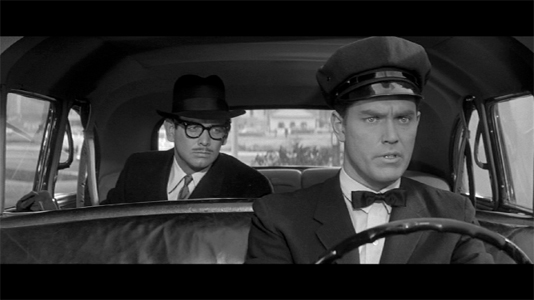
A glossy venture from Paramount, Man-Trap counts as the sole feature film to be directed by actor Edmond O'Brien (D.O.A.), whose only other behind-the-camera credits were an episode of the TV anthology Schlitz Playhouse and the 1954 melodrama Shield for Murder (which he co-directed with Howard W. Koch). He does a decent if inconsistent job here, with highlights such as the exciting chase sequence greatly outnumbered by turgid, dialogue-driven scenes that have the numbing efficiency of the era's TV dramas (one half expects Perry Mason to come strolling in with a few questions).
Discounting the fact that it has several sequences that are drawn-out or completely unnecessary (the Korea prologue, for instance), Man-Trap coasts along on its own sordid, pulpy appeal. O'Brien gets some decent performances out of Jeffrey Hunter and David Janssen - and a terrible, scenery-chewing one from Stella Stevens (part of that terribleness might be due to the underwritten nature of the Nina character, but still). The story is pretty solid and seems to have the earmarks of its source novelist, John D. MacDonald. MacDonald, best known for his color-titled Travis McGee mysteries, had a gift for taking archetypes like this property's predatory female and duplicitous ex-buddy and involving them in bracingly realistic, smartly written stories. His flair is sorely missed in the final script, however, which is overall rather blah. This is one of those films that is all dressed up like an A-picture, but its B-level soul becomes apparent as soon as the characters open their mouths.
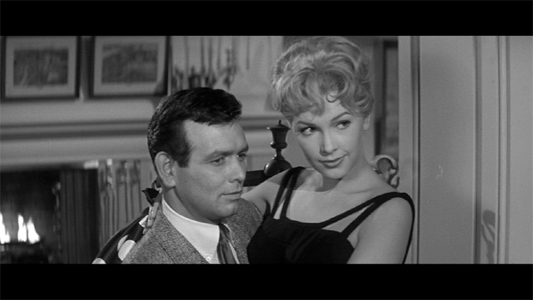
Another notable thing about Man-Trap is its depiction of the Lena character and the obnoxious, leeching neighbors she hangs out with. This film's suburbia might look pleasant from the outside, but basically it's a hedonistic hellhole filled with gossips and interlopers, forever on the lookout for the next drunken party gimmick (like Lena's martini-filled squirt gun). The sheer repulsion of it all makes one wonder what Edmond O'Brien's neighbors thought of him after seeing this.
Despite Man-Trap's numerous faults, it still rates as a fun, often campy popcorn crime caper. The film certainly looks good. Although it's overlit and has an overt fondness for back projection and other studio trickery, the Panavision photography has a nice glossy sheen. There's also some excellent shots of 1961-era San Francisco, lots of nifty, chrome-encased cars, and several evocative, Mad Men-ish outfits from workhorse designer Edith Head. All this, and an exciting if unsubtle score by crime-jazz composer Leith Stevens, too.
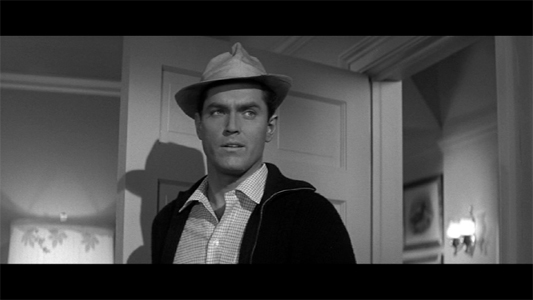
The DVD:
Video:
Olive Films' DVD edition of Man-Trap presents the film in nice 2.35:1 letterboxed anamorphic widescreen, which preserves the Panavision photography well. Although the cinematography is not very memorable, they appeared to have sourced the disc from a good-quality print which has only isolated instances of dust/specks.
Audio:
The disc only sports the film's original mono soundtrack, which sounds perfectly fine. I would have preferred hearing Stevens' score in a nicer way (was it ever released as an LP?), but the music and dialogue are pleasant enough. No subtitles on this no-frills disc.
Extras:
None.
Final Thoughts:
Actor Edmond O'Brien didn't exactly make a splash when he was sidelined into directing the overwrought, weirdly structured, not entirely successful late-period film noir Man-Trap. The film is fun, however, and worth a look for those with a yen for generically handsome leading actors, finger-snappin' crime jazz, or postcard views of 1961 San Francisco filmed in glorious Panavision. Recommended.
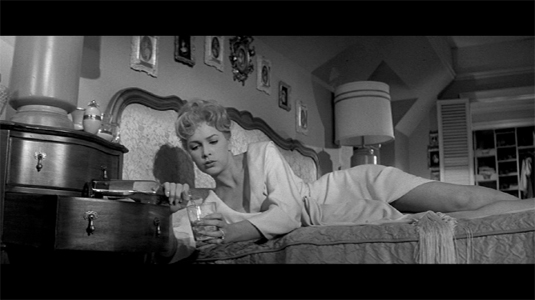
Matt Hinrichs is a designer, artist, film critic and jack-of-all-trades in Phoenix, Arizona. Since 2000, he has been blogging at Scrubbles.net. 4 Color Cowboy is his repository of Western-kitsch imagery, while other films he's experienced are logged at Letterboxd. He also welcomes friends on Twitter @4colorcowboy.
|
| Popular Reviews |
| Sponsored Links |
|
|
| Sponsored Links |
|
|
| Release List | Reviews | Shop | Newsletter | Forum | DVD Giveaways | Blu-Ray | Advertise |
|
Copyright 2024 DVDTalk.com All Rights Reserved. Legal Info, Privacy Policy, Terms of Use,
Manage Preferences,
Your Privacy Choices | |||||||









